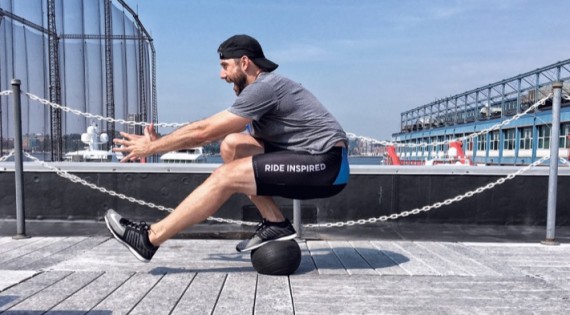Work it out.
Albi Skenderi ’09
- ReFit director and trainer, New York City
- Economics major
- Former member of the men’s track and field team
Set a goal: “You have to have a purpose for working out. That has to be a key point for anyone. For me it has always been about signing up for an event and working toward it. That way you don’t have to think long term but rather week by week. You set a schedule for the week and try to maintain it. Next week do the same. For example, I recently learned how to swim. I signed up for a triathlon three months before I learned how to swim. Every day I had to train I knew I had to be there because, if I didn’t show up, I would be in a bad place come race day. So setting that one goal just a couple months before motivated me to train. When that was done, I moved on to something else that was two months in the future.”
Use social media: “When I post a new workout, I get support from friends and even people I don’t know. That drives me to provide more content and it motivates me to actually get active.”
Dress the part: “I can’t stress enough how important this is. First of all, it makes you feel great to know that your gym outfit looks amazing. (Don’t be embarrassed; we all love to feel good and look good.) If you can dish out some extra cash for a couple of good pieces from top-name brands, do it; they will last longer and perform better.”
About Albi
“I am an in-home personal trainer. I am the guy who rings the bell at 5 a.m. or is calling your phone to wake you up and tell you that your training session is here. When I left Wheaton I had already lined up a job in finance. I graduated on a Saturday and started work that next Monday morning in a suit and tie at Barclays Capital in New York City. As I quickly adjusted in a 9 a.m. to 9 p.m. role, I realized that I needed something else to help me pursue my passion, which was fitness at the time. I had been part of the Wheaton track and field team and knew that being an overall healthy athlete benefited me on and off the track. So with that little passion still igniting, I started my own company called ReFit. My economics major helps me notice trends in the fitness industry and examine how the fitness market will behave to changes in the world. It prepared me to break things apart and figure out where I need to change my strategy in order to align myself as best possible with my clients’ needs for personal training. I travel to client locations to train them and offer group workout classes in Central Park during the spring, summer and fall. I enjoy this work because I see the sacrifice that people make to stay healthy. I try to offer training sessions that are quick and effective so they can get back to their busy lives. ”
Top three excuses people give for not working out and his answers back:
- I don’t have the right clothes ready.
Pack the night before. - I can’t wake up early enough to fit it in.
Set up your alarm in another room; just getting up to go turn it off will wake you up. - Something came up.
Work out after the “something.”
Three questions to consider when choosing a personal trainer:
Can you have a five-minute conversation?
“Picking a trainer is also like picking a therapist. You will get to know them and they will get to know you thoroughly through your sessions. Having that connection or even having a personable conversation goes a long way. Trust is very important here and having that is going to go a long way when you are trusting this trainer to take chances and take your body to new limits.”
Do they know their stuff or are they reading a script?
“If the first thing a trainer does is start looking at pieces of paper and throughout your workout is more worried about writing everything down, that might not be the trainer for you. A good trainer needs to constantly observe you and your body movements. They are the person responsible to make sure every second that you are training your form is being observed, so that they can tweak things to make sure you have the best training session. A trainer should be prepared for the session and be able to explain to you what they are going to take your body through in your session.”
Are you on the same page?
“Is your trainer matching your energy? Are they matching your enthusiasm when you are telling them about your short- and long-term goals? Do you see wheels spinning in their head (hypothetically) when you are telling them about your next race or obstacle course as they think about which amazing workout to put you through? They are paid to give you the best result at the end, so make sure you align yourself with someone who matches your energy level. If it’s not a good fit for you, ask to workout with another trainer. Trust me your facility will not say no.”

